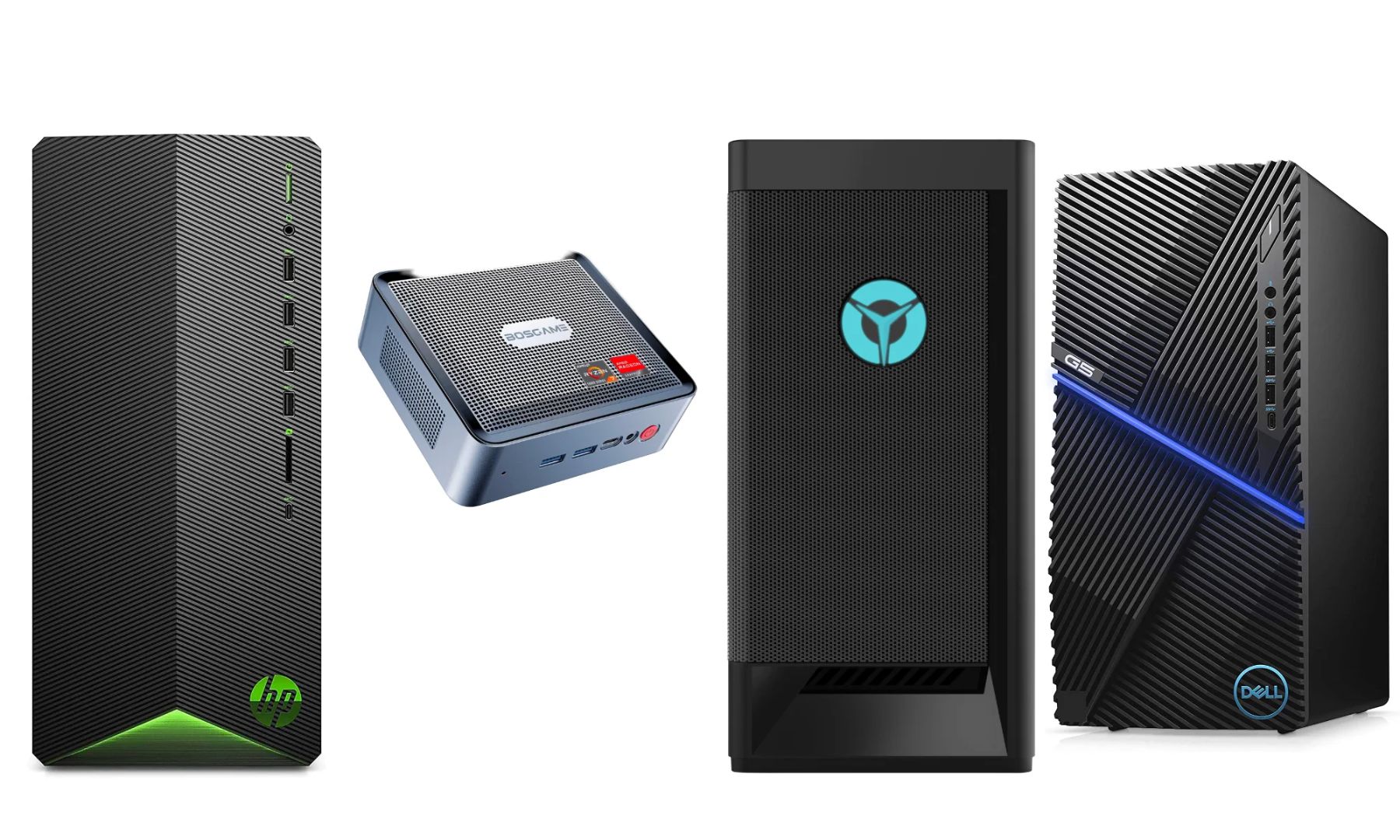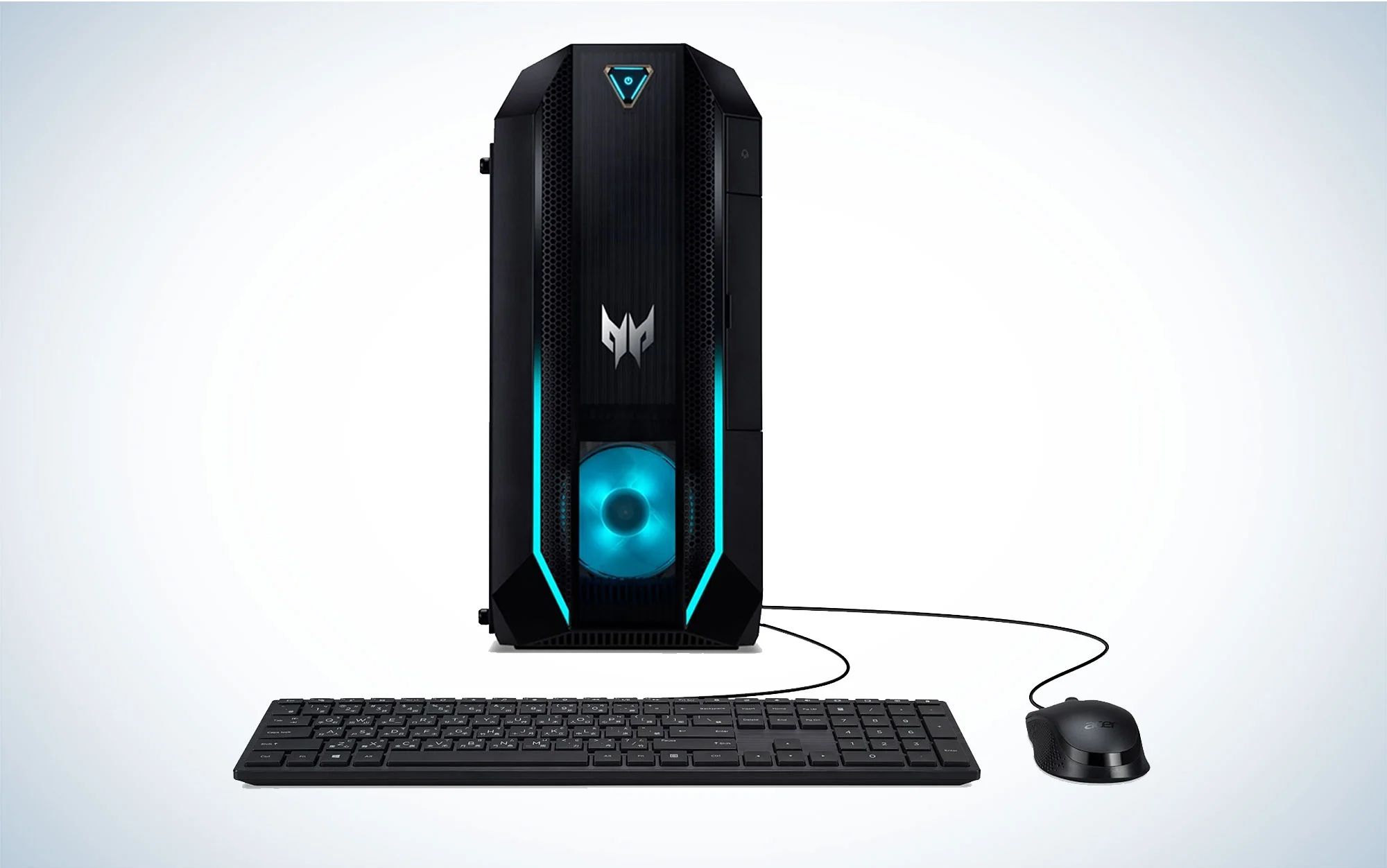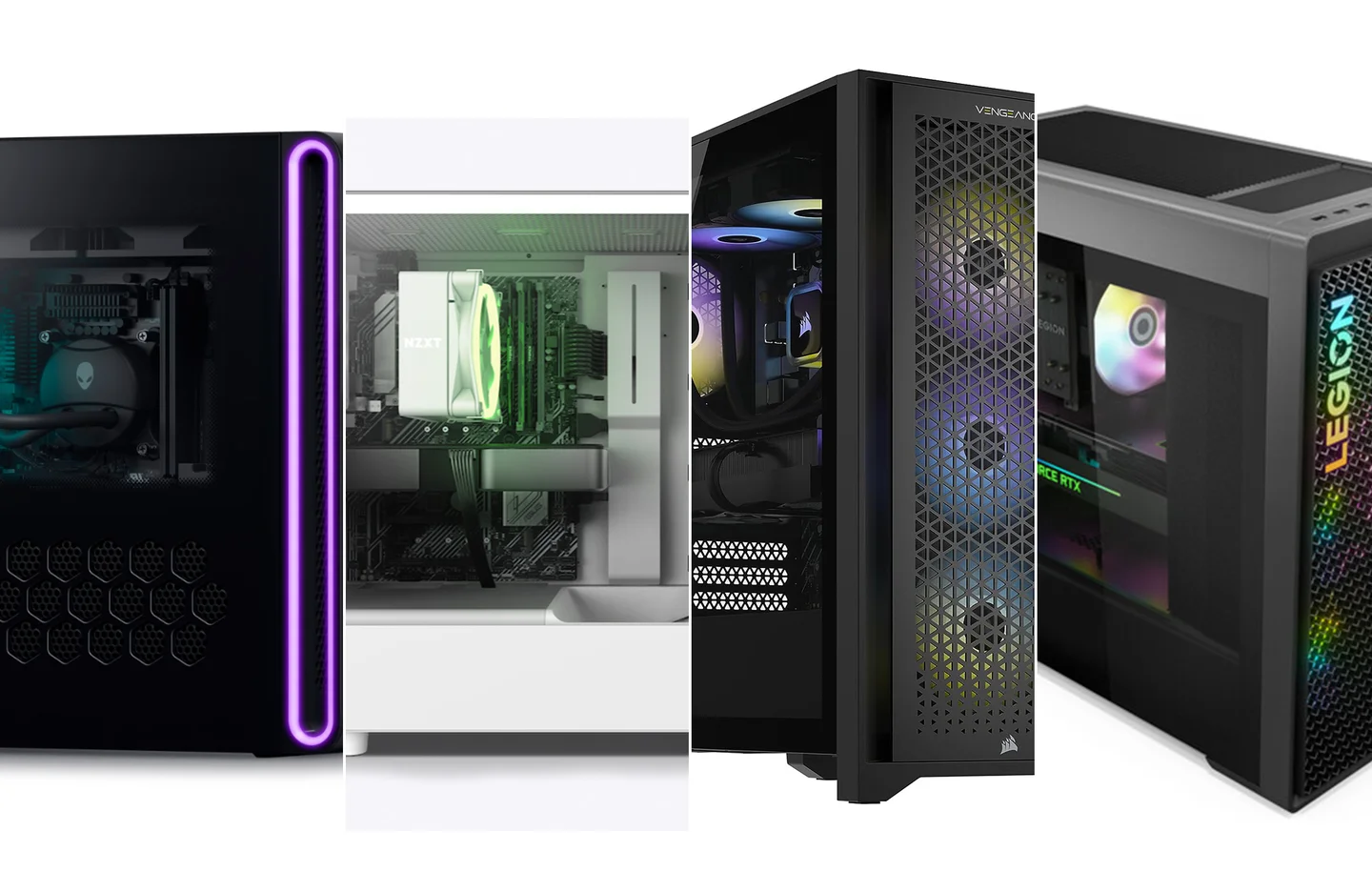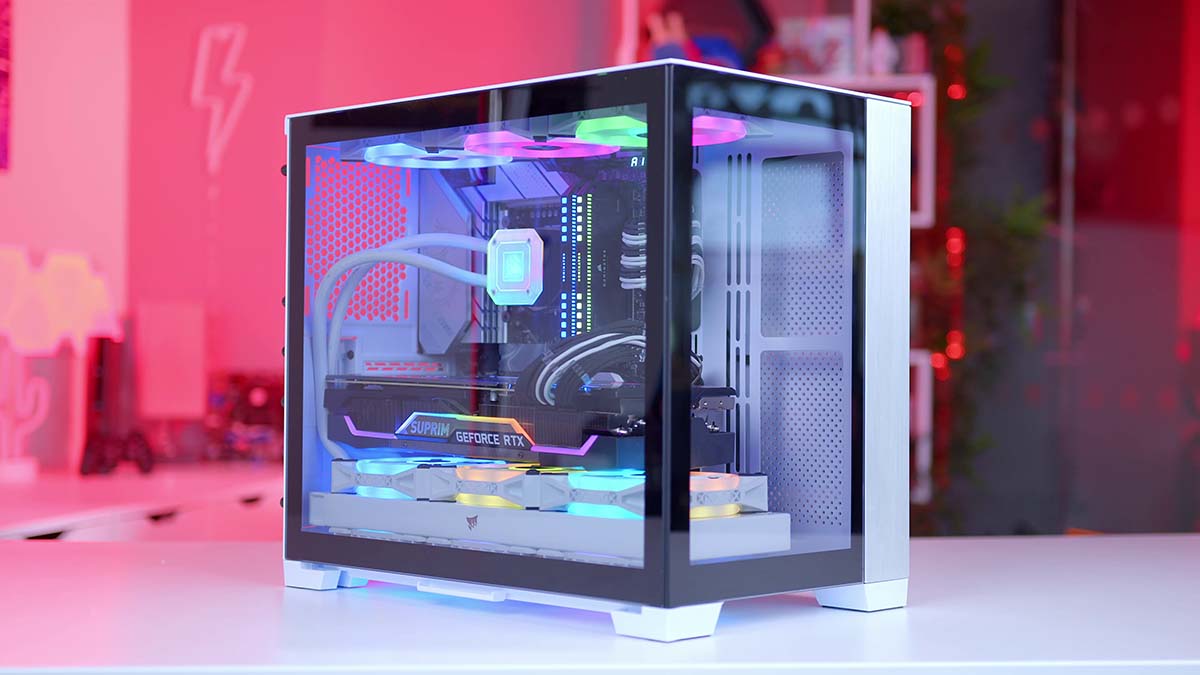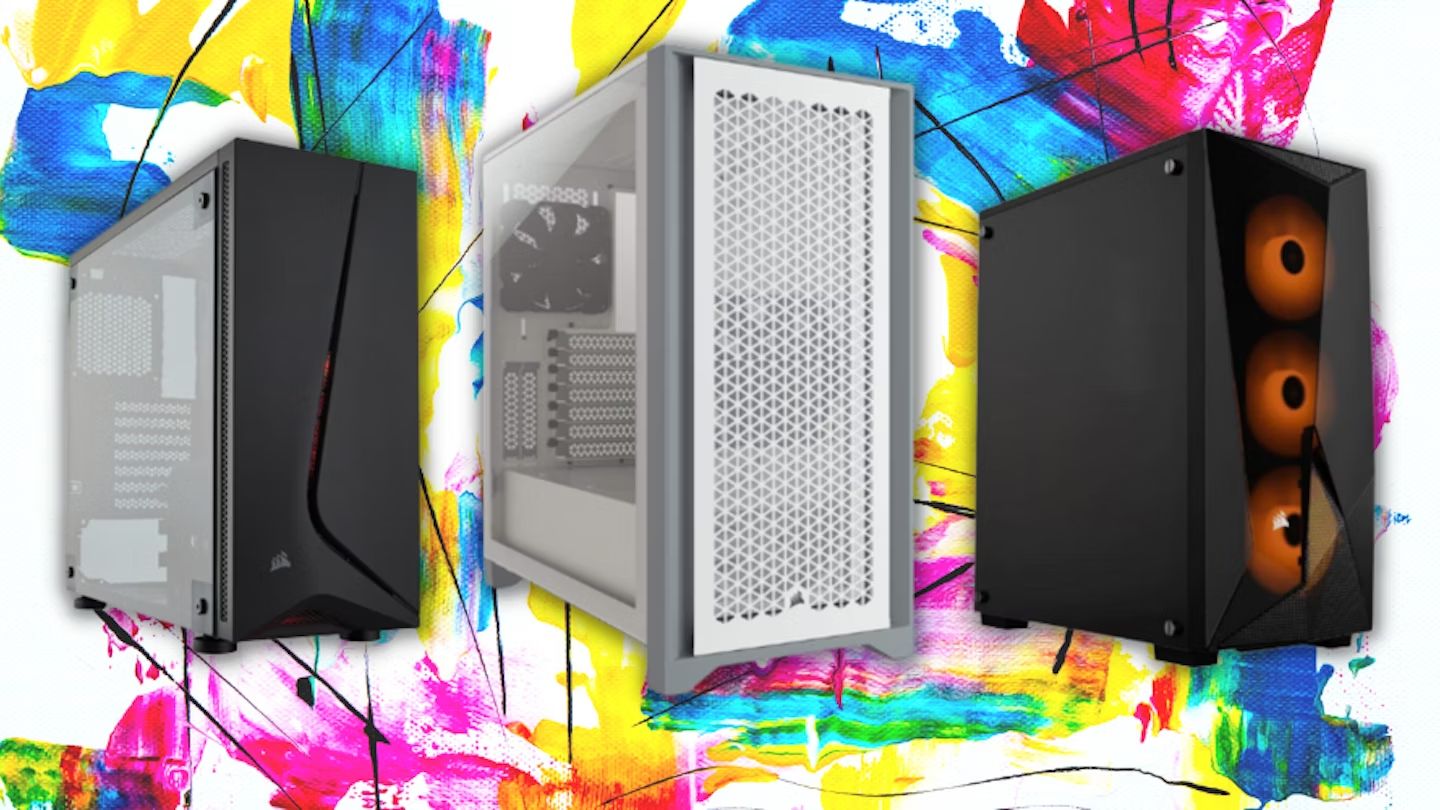Introduction
Welcome to the world of gaming! If you are an avid gamer or just starting to dive into the gaming scene, having a good gaming PC is essential to elevate your gaming experience. A gaming PC not only allows you to play the latest and most demanding games but also ensures smooth gameplay with high-quality graphics and fast processing times.
So, what exactly is a good gaming PC? Simply put, it is a computer specifically designed and optimized for gaming purposes. It consists of carefully selected components that work together to provide the best performance and graphics capabilities for gaming enthusiasts. In this article, we will explore the key components that make up a good gaming PC, including the processor, graphics card, memory, storage, cooling system, power supply, motherboard, operating system, and peripherals.
Each of these components plays a crucial role in determining the overall performance of your gaming PC. From the speed and power of the processor to the graphics capabilities of the graphics card, every aspect is carefully considered to deliver an immersive and lag-free gaming experience.
Before diving into the details of each component, it is important to note that building or buying a gaming PC can be overwhelming, especially for beginners. There are numerous options available in the market, and technical jargon can often be confusing. However, with the right information and guidance, you can make an informed decision and select the best components that suit your gaming needs and budget.
Whether you are a casual gamer or a competitive esports enthusiast, investing in a good gaming PC will undoubtedly enhance your gaming experience. So, let’s delve deeper into the various components that contribute to a powerful gaming PC and discover what makes them indispensable for an immersive and thrilling gaming adventure.
Processor
The processor, often referred to as the “brain” of the computer, is a crucial component of any gaming PC. It determines the speed and performance of your computer by executing commands and calculations needed to run video games smoothly.
When it comes to gaming, a powerful processor is essential. The processor’s speed, measured in gigahertz (GHz), determines how quickly it can process information. A higher clock speed translates to faster processing times, which results in improved game performance and quicker response times.
In addition to clock speed, the number of cores is another important consideration. Cores are essentially individual processing units within the processor. Gaming PCs typically have processors with multiple cores, ranging from four to eight or more. In multi-threaded games, more cores allow for better multitasking, allowing the computer to handle complex game calculations and other tasks simultaneously.
One popular choice for gaming processors is the Intel Core series, particularly the Core i5 and i7 models. They offer excellent single-threaded performance and are well-suited for gaming. Alternatively, AMD Ryzen processors are also gaining popularity due to their competitive pricing and multi-threaded performance.
When selecting a processor for your gaming PC, it’s important to consider the compatibility with other components such as the motherboard and graphics card. Ensure that the socket type of your chosen processor is compatible with the motherboard to avoid any compatibility issues.
Ultimately, investing in a powerful processor will significantly impact your gaming experience. It will allow you to play the latest games at high settings and experience smoother gameplay with minimal lag. While processors can be expensive, they are a crucial component of a good gaming PC and should be chosen wisely based on your specific gaming needs and budget.
Graphics Card
A graphics card, also known as a GPU (Graphics Processing Unit), is one of the most important components of a gaming PC. It is responsible for rendering and displaying the visuals in video games, including the textures, lighting effects, and overall graphics quality.
For gaming, a powerful graphics card is crucial to ensure smooth gameplay and stunning visuals. The graphics card determines how well your PC can handle graphically demanding games and the level of detail and resolution it can display.
When choosing a graphics card, there are a few key factors to consider. The first is VRAM (Video Random Access Memory), which determines the card’s ability to handle and process large amounts of graphical data. Higher VRAM capacities, such as 6GB or 8GB, are recommended for gaming PCs as they provide smoother gameplay and better graphics quality.
The GPU architecture is also an important consideration. NVIDIA and AMD are the leading manufacturers of graphics cards, with their respective architectures known as GeForce and Radeon. Both offer a range of models catering to different gaming needs and budgets.
Another essential consideration is the performance benchmarks of the graphics card. Look for reviews and comparisons that provide insights into a card’s performance in specific games or benchmarks. This will give you an idea of how well it can handle the games you intend to play.
The cooling system of the graphics card is also worth noting. High-performance graphics cards tend to generate significant heat, so it’s important to ensure it is adequately cooled. Look for cards with efficient cooling solutions, such as multiple fans or liquid cooling, to prevent overheating and maintain optimal performance.
Lastly, consider your display setup. If you have a high-resolution monitor, such as a 4K display, you’ll need a graphics card that can support such resolutions. Additionally, if you’re interested in virtual reality gaming, ensure that the graphics card is VR-ready to provide a smooth and immersive VR experience.
Ultimately, a powerful graphics card is essential for gaming PCs. It determines the visual fidelity and performance of your games. Invest in a graphics card that suits your gaming needs and budget, and you’ll be able to enjoy stunning visuals and smooth gameplay for years to come.
Memory (RAM)
When it comes to gaming, having sufficient memory, also known as RAM (Random Access Memory), is crucial for optimal performance. RAM acts as a temporary workspace for your computer, storing data that the processor can quickly access, allowing for smoother multitasking and faster game loading times.
For gaming PCs, it is recommended to have at least 8GB of RAM. This is considered the minimum requirement for most modern games. However, for a more future-proof setup and to accommodate for multitasking, 16GB or even 32GB of RAM is highly recommended.
The speed of the RAM is another important factor to consider. RAM speed is measured in megahertz (MHz), and higher MHz values indicate faster data transfer rates. While faster RAM can provide a slight performance boost, it is not as crucial for gaming as other components like the processor or graphics card.
If you’re building a gaming PC, ensure that the motherboard supports the RAM module type you choose, such as DDR4. Additionally, consider the number of RAM slots on the motherboard. This will determine the maximum amount of RAM you can expand to in the future.
It’s worth noting that while having more RAM is beneficial, excessive amounts won’t necessarily translate into better gaming performance. The key is to strike a balance between having enough RAM to handle the game’s requirements and leaving room for other system processes.
In addition to gaming, the amount of RAM can impact other tasks such as video editing, streaming, and running multiple applications simultaneously. Therefore, investing in ample RAM will not only enhance your gaming experience but also improve overall system performance.
In summary, having sufficient RAM is essential for a good gaming PC. Aim for at least 8GB, with higher capacities recommended for future-proofing and multitasking. Choose compatible RAM modules based on your motherboard’s specifications, and remember to strike a balance between capacity and performance for optimal gaming and system efficiency.
Storage
When it comes to gaming, storage is an often overlooked but crucial component of a gaming PC. The storage device is where your games, operating system, and other files are stored, and it plays a significant role in game loading times and overall system responsiveness.
Traditional hard disk drives (HDDs) have been the standard for storage in the past. However, for gaming PCs, solid-state drives (SSDs) are highly recommended. SSDs offer faster read and write speeds, resulting in significantly faster game loading times and overall system performance.
When selecting storage for your gaming PC, consider a solid-state drive as the primary drive for your operating system and most frequently played games. SSDs come in different capacities, typically ranging from 256GB to 2TB or more. Choose a capacity that can accommodate the games you play regularly, ensuring you have enough space for updates and future game installations.
While SSDs are faster, they are also more expensive per gigabyte compared to HDDs. As a budget-friendly option, you can consider a combination of an SSD for the operating system and frequently played games, and an HDD for storing larger game libraries and files.
Another option to enhance storage performance is using an NVMe (Non-Volatile Memory Express) SSD. NVMe SSDs utilize the PCIe interface and offer even faster speeds compared to traditional SSDs. However, they tend to be more expensive and may not provide a significant advantage for gaming unless you’re working with large files or performing intensive tasks.
Lastly, consider the reliability and lifespan of the storage device. SSDs are generally more durable than HDDs as they don’t have moving parts, but both types of drives can fail due to various factors. It’s always recommended to have a backup system in place to prevent data loss.
In summary, selecting the right storage for your gaming PC is crucial for fast game loading times and overall system responsiveness. Prioritize using a solid-state drive (SSD) as the primary drive for your operating system and frequently played games. Consider the capacity based on your gaming needs and budget, and you can also utilize a combination of SSD and HDD to strike a balance between speed and storage space.
Cooling System
Ensuring proper cooling for your gaming PC is essential to prevent overheating and maintain optimal performance. As gaming requires the hardware components to work harder, they generate significant heat, which can negatively impact the system’s stability and lifespan if not managed properly.
There are two primary components of a cooling system: the CPU cooler and the case fans.
The CPU cooler is responsible for cooling the processor. There are two types of CPU coolers: air coolers and liquid coolers. Air coolers consist of a heatsink and a fan, which draw heat away from the CPU. Liquid coolers, on the other hand, use a pump to circulate liquid coolant through a radiator to dissipate heat. Liquid coolers generally provide better cooling performance and are especially beneficial for overclocking, but they can be more expensive.
In addition to the CPU cooler, case fans are crucial to maintaining good airflow within the PC case. They help dissipate heat generated by the graphics card, motherboard, and other components. Having proper airflow ensures that hot air is efficiently expelled from the case and replaced with cooler air. It is recommended to have a combination of intake fans at the front of the case and exhaust fans at the rear and top to create a balanced airflow.
Another aspect to consider is the size and design of your PC case. Larger cases generally offer better airflow and more space for additional fans and cooling solutions. Additionally, cases with good cable management options can help improve airflow by reducing obstructions and ensuring tidy cable routing.
Proper monitoring of your system’s temperature is important to ensure that it remains within safe limits. Software tools and hardware monitors can provide real-time temperature readings for your CPU and GPU. If temperatures are consistently running high, additional cooling solutions may be required, such as more powerful fans or liquid cooling systems.
Regular maintenance is also important for a cooling system. Dust buildup can hinder airflow and impact cooling performance. Periodically cleaning your PC’s components, especially fans and heatsinks, will help maintain optimal cooling efficiency.
In today’s gaming PCs, where high-performance hardware is common, investing in a reliable and effective cooling system is crucial. Proper cooling will not only enhance your gaming PC’s performance and longevity but also ensure a stable and enjoyable gaming experience.
Power Supply
The power supply unit (PSU) is a critical component of any gaming PC. It is responsible for converting the electricity from your wall outlet into the appropriate voltage and current needed to power your computer’s components. Choosing the right power supply is crucial to ensure optimal performance, stability, and longevity of your gaming PC.
When selecting a power supply, consider both the wattage and the efficiency rating. The wattage determines the maximum power output that the PSU can handle. It’s crucial to choose a power supply with enough wattage to meet the requirements of your system. A power supply with insufficient wattage can lead to instability, system crashes, or even damage to your components. It’s recommended to calculate the power requirements of your PC based on the components you intend to use and choose a power supply with a slightly higher wattage to provide some headroom for future upgrades.
Efficiency rating is another important factor to consider. Efficiency rating indicates how efficiently the PSU converts the incoming AC power into DC power for your components. Higher-efficiency power supplies waste less energy, generate less heat, and tend to be more reliable. Look for power supplies with a rating of 80 Plus Bronze, Silver, Gold, or higher for optimal efficiency.
The form factor of the power supply should also be compatible with your PC case. Most gaming PCs use ATX form factor power supplies, but mini-ITX or micro-ATX builds may require smaller form factor PSUs. Make sure to check the compatibility with your case before purchasing.
Cable management is another consideration when choosing a power supply. Modular or semi-modular power supplies allow you to connect only the necessary cables, reducing cable clutter and improving airflow within the PC case.
One thing to note is that quality is vital when it comes to power supplies. Investing in a reliable and reputable brand is essential to ensure stable power delivery and to protect your components from electrical fluctuations. Look for power supplies from well-known manufacturers with good reviews and warranties.
In summary, choosing a suitable power supply is crucial for the stability and longevity of your gaming PC. Ensure that you select a power supply with adequate wattage, high efficiency rating, compatible form factor, and reputable brand. By doing so, you’ll have a reliable power source that supports your gaming PC’s performance and protects your valuable components.
Motherboard
The motherboard is the central component that connects and enables communication between all the other hardware components in your gaming PC. It serves as the foundation on which your entire system is built. Selecting the right motherboard is crucial for ensuring compatibility, expansion options, and overall system performance.
When choosing a motherboard for your gaming PC, consider the socket type and compatibility with your chosen processor. Different processors require specific socket types, such as LGA1151 for Intel or AM4 for AMD. Ensure that the motherboard you choose supports the socket type of your processor to avoid any compatibility issues.
The form factor of the motherboard is another consideration. The most common form factor for gaming PCs is ATX, which provides ample space for expansion slots and connectors. However, smaller form factors such as micro-ATX and mini-ITX are also available and are suitable for compact or portable gaming PCs.
Expansion slots and connectivity options are important factors to consider, especially if you plan to add additional components in the future. Look for motherboards with sufficient PCIe slots for adding graphics cards, network cards, or storage expansion. Consider the number of USB ports, audio jacks, and SATA connectors to ensure they meet your present and future needs.
It’s also worth considering the quality of the motherboard’s power delivery system and its ability to handle high-performance components. Look for motherboards with quality VRMs (Voltage Regulator Modules) and heat sinks to ensure stable power delivery and prevent overheating.
Another crucial factor is the motherboard’s BIOS (Basic Input/Output System). The BIOS provides the firmware that allows your hardware to communicate with your operating system. Ensure that the motherboard’s BIOS supports the features and settings you require, such as overclocking or advanced fan control.
Lastly, consider the brand and reputation of the motherboard manufacturer. Reputable brands tend to offer better build quality, support, and reliability. Research customer reviews and recommendations to help guide your decision.
In summary, the motherboard is a vital component that ensures compatibility and connectivity between all other components of your gaming PC. Consider factors such as socket type compatibility, form factor, expansion options, power delivery, BIOS features, and brand reputation when choosing a motherboard. Investing in a reliable and well-suited motherboard will provide a stable foundation for your gaming PC and allow for future expansion and upgrades.
Operating System
The operating system (OS) is the software that allows your gaming PC to function and provides an interface for you to interact with your computer and run applications, including video games. Choosing the right operating system is essential for compatibility, performance, and accessing the latest gaming features.
One of the most popular operating systems for gaming is Microsoft Windows. Windows 10 is widely used and supported by the majority of PC games and gaming-related software. It offers a user-friendly interface, extensive driver support, and regular updates to enhance performance and security.
Another option is Linux, a free and open-source operating system. While Linux has gained popularity among certain gaming communities, it can have compatibility issues with certain games that are primarily designed for Windows. However, with the increasing support from game developers and the availability of tools like Proton, Linux gaming is becoming more viable.
macOS, the operating system developed by Apple, is an option for gamers who have a Mac computer. While macOS offers a visually appealing interface and seamless integration with Apple’s ecosystem, it has a more limited selection of games compared to Windows.
When selecting an operating system, consider the compatibility with the games you want to play. Most major game developers primarily optimize their games for Windows, and some games are exclusive to the Windows platform. Additionally, consider the availability of drivers for your hardware components, as Windows tends to have better driver support.
Another factor to consider is the performance of the operating system. Windows 10 provides DirectX, a set of application programming interfaces (APIs) that allow game developers to access hardware features efficiently. DirectX is widely used in gaming and offers performance advantages compared to other operating systems.
It’s worth mentioning that online gaming platforms, such as Steam, often have support for multiple operating systems. Check the system requirements for the games you intend to play and ensure that your chosen operating system meets those requirements.
In summary, choosing the right operating system is crucial for gaming. Windows 10 is the most widely used and compatible with the majority of PC games, offering regular updates and extensive driver support. Linux and macOS are viable options depending on your preferences and the games you intend to play. Consider compatibility, performance, and available game libraries when selecting an operating system for your gaming PC.
Peripherals
Peripherals are the devices that enhance your gaming experience and provide the means to interact with your gaming PC. These devices include the keyboard, mouse, monitor, and audio equipment.
When choosing a keyboard for gaming, consider features such as mechanical switches, customizable RGB lighting, and programmable keys. Mechanical keyboards offer a tactile feel and faster response times compared to membrane keyboards, making them ideal for gaming. Additionally, customizable lighting and programmable keys allow for personalization and improved gaming efficiency.
A gaming mouse is another essential peripheral that should provide precision, comfort, and customization options. Look for mice with adjustable DPI (dots per inch) settings, allowing you to fine-tune the sensitivity based on your preferences. Additional features such as customizable buttons, ergonomic design, and RGB lighting can further enhance your gaming experience.
Your choice of monitor is crucial for gaming visuals. Look for monitors with a high refresh rate (e.g., 144Hz or higher) and low response time to ensure smooth gameplay and reduce motion blur. Consider the resolution and size based on your preferences and the capabilities of your graphics card. Some monitors also include features like adaptive sync (e.g., AMD FreeSync or NVIDIA G-Sync) to eliminate screen tearing and provide a smoother gaming experience.
Audio equipment is also essential for an immersive gaming experience. A headset with good sound quality and comfort is crucial to fully enjoy game audio and communicate with teammates. Consider features such as surround sound, noise cancellation, and microphone quality when choosing a gaming headset.
Other optional peripherals that can enhance your gaming experience include gaming controllers, steering wheels, or flight sticks, depending on the types of games you enjoy playing. These peripherals provide more immersive and precise controls for specific genres like racing or flight simulation.
Lastly, cable management and desk organization can greatly improve your overall gaming experience. Keep your peripherals organized and ensure that cables are neatly routed and secured to avoid clutter and tangling.
In summary, peripherals play an important role in enhancing your gaming experience. Choose a keyboard and mouse that offer comfort, customization, and responsiveness. Invest in a high-quality monitor for smooth visuals and consider audio equipment for immersive sound. Optional peripherals like gaming controllers and steering wheels can further enhance specific gaming genres. Overall, selecting peripherals that align with your gaming preferences and provide comfort and functionality will elevate your gaming experience to new heights.
Conclusion
Building or selecting a good gaming PC involves careful consideration of various components to ensure optimal performance, graphics quality, and a satisfying gaming experience. From the processor and graphics card to the memory, storage, cooling system, power supply, motherboard, operating system, and peripherals, each component plays a crucial role in shaping your gaming PC’s capabilities.
The processor acts as the brain, executing commands and calculations necessary for smooth gameplay. The graphics card determines visual quality and performance, with higher-end models delivering stunning graphics and faster rendering times. Sufficient memory (RAM) ensures quick data access, multitasking capabilities, and faster game loading times. Storage, particularly solid-state drives (SSDs), provides fast and reliable access to your games and files.
A proper cooling system is crucial to prevent overheating and maintain optimal performance, while a reliable power supply ensures stable power delivery to all your components. The motherboard serves as the foundation, allowing for compatibility and expansion options. The choice of the operating system impacts game compatibility, performance, and access to gaming features.
Peripherals such as keyboards, mice, monitors, and audio equipment enhance your gaming experience, providing comfort, precision, and immersion. Considering cable management and desk organization also contribute to a clean and enjoyable gaming setup.
Remember, when selecting components, it’s essential to strike a balance between your gaming needs and budget. Research, read reviews, and consider expert opinions to make informed decisions that suit your specific requirements.
In conclusion, a good gaming PC is a combination of carefully chosen components that work together seamlessly to deliver immersive and high-performing gaming experiences. By understanding the different aspects and selecting the right components, you can create a gaming PC that meets your gaming needs, enhances your gameplay, and provides countless hours of enjoyment.











